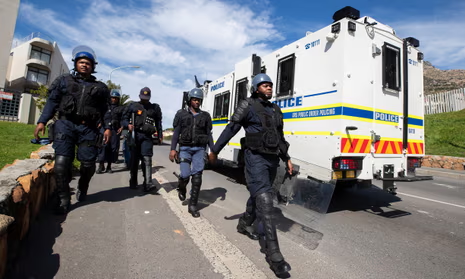Xenophobic violence and hate crime in South Africa is increasing. This paper discusses the incidents of how law enforcement reacts toward such acts and the importance of upholding all communities equal under protection.
In the recent years, South Africa faces a painful and complex challenge; that is, to address hate crime and xenophobic tensions in a way that delivers justice, keeps all communities safe, and upholds human rights. Though many of the local and international migrants living and working peacefully all across the country these isolated incidents of hostility have captured the country’s attention, raising important questions.
Do interventions reflect a targeted approach to the illegality, or can some be perceived as ethnically motivated? This paper delves into the present dynamics, giving a balanced and evidence-based view of a sensitive issue.
Hate crimes are acts that are criminal and that are committed against individuals or groups based on their identity- be it nationality, ethnicity, or religion. Xenophobia is defined as the more general label for fear, distrust, or hostility toward others from other countries.
In South Africa, these tensions mostly play out within the context of the highly urbanized and densely populated areas. Local frustrations at times find a venty — due to issues of unemployment, housing shortages, or service provision — and turn against the migrant population.

Key incidents that have sparked concern
Several incidents in recent years have sparked a national debate:
• In 2022, community service delivery protests in Gauteng turned violent and allegedly targeted foreign informal traders.
• In Johannesburg, a controversial movement known as Operation Dudula has called for more action against undocumented migrants. Critics have warned about possible profiling.
These are events not reflective of the national mood but underscore with urgency the need for clear, fair, and constitutionally based responses.
Pertaining hereto is
law enforcement and
community safety
South African law enforcement has a constitutional obligation to extend protection to all persons within South Africa, irrespective of their nationality; whether such acts of violence or discrimination are meted out against citizens or foreigners residing in South Africa.
This will include:
• The establishment of specialized police units in identified xenophobic hotspot areas
• Sensitization training for the handling of hate crime reports
• Public campaigns for unity and integration
“It does not matter where people come from; what matters is whether they are treated fairly under the law,” said Major Sipho Mthombeni, provincial commander of SAPS. Though, civil society concerns have also emerged about operations that appear to target foreign-owned businesses disproportionately or informal housing communities.
Public talk on social media, which can at times build up fears or give out news about outsiders. In this setting, it is even more key for the press and police to:
• Use right words
• Not make broad statements
• Say the good works of the community
Many workers are a big part of South Africa’s not formal set up for money and social life, adding to areas like selling, moving, and health care.
Problems faced by migrant groups
Vulnerable, often non-documented migrant communities face issues at multiple levels:
• Access to public services becomes rather cumbersome
• There is a barrier of language and culture
• Without adequate legal knowledge or representation
• More exposed to informal evictions or extortion
These factors imply that intervention must be done in an approach to human rights principles, and thereby enforcement action should not unwittingly create more significant problems and deepening distrust.
Legal protection and progress
Several safeguards in the South African legal system:
• The Constitution guarantees equality and freedom from discrimination
• The Promotion of Equality and Prevention of Unfair Discrimination Act addresses hate speech and unfair treatment
• Bills and public consultations are underway. To strengthen hate crime and hate speech laws
Law enforcement is but one component of the apparatus of the social contract for maintaining tranquillity, and it must be imbued with much broader efforts, such as those related to the Building Bridges: Solutions Beyond Policing project; this later includes…
While law enforcement is one piece of the social contract for keeping the peace, it must integrate with wider efforts encapsulated within the Building Bridges: Solutions Beyond Policing project, which includes…
A large majority of South Africans do not give their support to xenophobia. What they want is justice and opportunity.
A hate crime and xenophobia-imbued South Africa cannot be fixed with alms or blame; it will take mindful listening, upholding a rights-based law with an iron hand, and policies that show a ray of hope for better coexistence. Every individual, be they a citizen or a migrant, deserves to have their dignity protected with a bit of security and the chance to flourish. By choosing justice over fear, unity over division, South Africa can continue to move towards a more just and resilient society.
